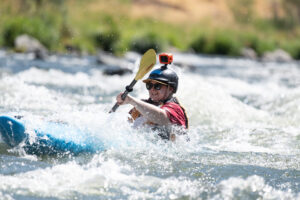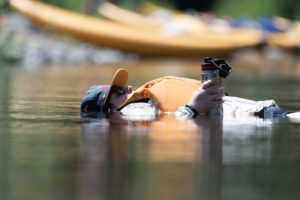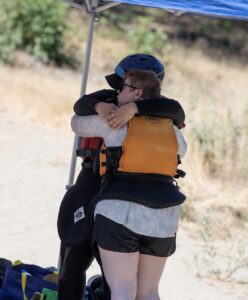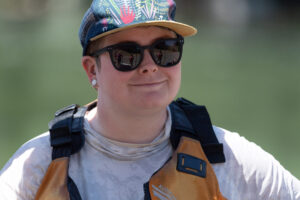Phone: 303.945.2490 Fax: 866.592.6911 Email: [email protected]
621 Kalamath St. Ste 175, Denver, CO 80204
Save the date and help us celebrate Out Living It Day on Saturday, July 27! Join a community adventure in your hometown and consider making a small donation to help us raise $25k to fuel adventure for others.
JOIN US FOR A 2024 HEALING ADVENTURE!
“I needed a week off from life more than I realized.”
When Morgan “Mo” McNeely joined a kayaking program on Oregon’s Rogue River with First Descents in 2023, adventure-based healing was something they had already fully embraced as a way to continue the process of living with terminal cancer.
“I’ve been pretty dialed in to the young adult cancer world through volunteering,” Mo shares. “I had known about First Descents for years from patient resources, and I’ve encouraged people to check it out. I’ve also had friends attend the trips and love it, and so as soon as it made sense for me to hop on an adventure, I signed myself up!”

The Canada native — they live in Edmonton, Alberta — also had been on several canoe trips with a foundation there, but those had been shorter, less intensive trips that didn’t focus as much on the continuing lifestyle changes like nutrition and mindfulness that Mo felt would be necessary to stay as healthy as possible going forward.
“I was diagnosed with Stage IV colon cancer in 2015, a few weeks shy of my 25th birthday,” Mo explains. “I’ve had treatment on and off for the last eight years — treatment plans are very different when you have a terminal diagnosis. You do chemo until you decide to stop, and you take breaks for the important things.”
Kayaking turned out to be one of the important things to Mo — so much so that since the Rogue River trip, they have continued to get out there on the water, and recently nailed the roll — although at first they were a little nervous. “I’d say I’m miles away from being fit or a great kayaker, and I’m not the best swimmer, and so was worried I would suck,” Mo confesses. “I was worried I’d be too fat for the kayak and gear, too slow to learn, too pale to be outside all day, every day.”
“But literally none of those things prevented me from having a great time,” they say. “It’s not at all about being good at the activity — it’s about giving yourself the grace to do something new, just because you can. You’ll take a lot more away from the trip than a skill.”

Mo also had some apprehension around meals, but “the chefs outdid themselves every single day. There was always a mix of very familiar food, slightly more adventurous options, and things I had never seen before. My dietary concerns were completely taken care of, and I had the chance to try some awesome lactose-free alternatives, too.”
But that still wasn’t the best thing about the trip.
“My favorite part of the program was the freedom happily given to me by the entire team,” Mo explains. “I got to play, to be my authentic self, and to be completely unburdened for the better part of a week. I didn’t have to worry about anything, because the FD team was there handling all of the mundane parts of being an adult for me and making sure I was having a great day. I didn’t have to push through fatigue to get things done.”
“There is so much more room for laughter and connection when you’re feeling that deep freedom.”
In addition to finding that freedom in healing adventure, Mo was able to bring back the nickname that had been part of their younger self, but hadn’t been revisited since they decided to fully embrace being nonbinary — and the FD program turned out to be the perfect time to do just that.
“Folks usually get their nickname from something important, funny and remarkable about themselves, but I thought, why not use this experience of meeting all these folks for the first time to explore my gender expression?” Mo says. “To have everyone meeting me as Mo, this intentionally gender-neutral name, was very special. I saw so much effort to use gender-neutral terms when addressing the group from everyone on the First Descents trip, too, and every single time, it made my soul glow a little brighter. Everyone was so impressively thoughtful, and I felt so held, included and safe. It gave me a lot of courage to start introducing myself as Mo back at home and more openly express my nonbinary self.”

Being free to be themselves at this point in their life was such an incredible gift, Mo says. “In my initial diagnosis, I was not expected to live long. My only option was chemo. Over time, as I responded well to chemo, surgery became an option. A chemo break for some summer adventures ended up lasting 18 months, because I was stable. When I grew new tumors, we tried radiation and oral chemo. Then I was stable for another nine months. When I grew new tumors again in 2020, my oncologist advocated to have a pretty wild surgery.”
Since that surgery, Mo has had no evidence of disease, which puts them in the unique place of having a terminal diagnosis and being under constant watch, but also seemingly being cancer-free. “I’m not in treatment; I’m not in remission. I’m definitely disabled from treatment, but I’m also doing my best to balance work and part-time studies, so … you tell me,” Mo says to the question of where they are on their cancer journey.
Even without a definitive answer at this point, Mo adds, it’s been hard to stop doing things. Like, all the things. “I keep doing too much, but when you’ve been told you’re gonna die, and then you don’t, it’s pretty hard to say no,” Mo says.

Mo had been just one class away from earning a bachelor’s degree in Earth science with a focus on physics, and after putting that on hold, they went back and not only got that degree, but now are pursuing a certificate in palliative care to help people in end stages of life and their loved ones navigate the process.
“I’m not a people person, but this experience has really changed so much for me,” Mo explains. “I’m so introverted, but while I was going through treatment, I realized how much I needed people and connection. And also, through this experience, a lot of my friends have died, and I supported them and their families through that, and I just got really good at it, and I really came to understand that it’s my vocation.”
“I realized, you know what, I really want to be the person that I could have reached out to when I got diagnosed,” Mo says. “Like, I want to be the person that I needed at that time. And so everything I’ve been through has helped me get to this place in my life, and I’m very grateful for it all.”
Thank you for sharing this story. As a cancer survivor, it’s hard to relate to many people at times. I related with Mo here. I now work for the Hole in the Wall Gang Camp, helping kids and young adults cope with living with a chronic illness. It’s the least I can do to pay it forward.
I can relate to not giving myself grace. Like you said, “It’s not at all about being good at the activity — it’s about giving yourself the grace to do something new, just because you can.” I still need to work on this in my life.
Say hi to my old friend Ray Shedd.
With Gratitude,
JimmyG